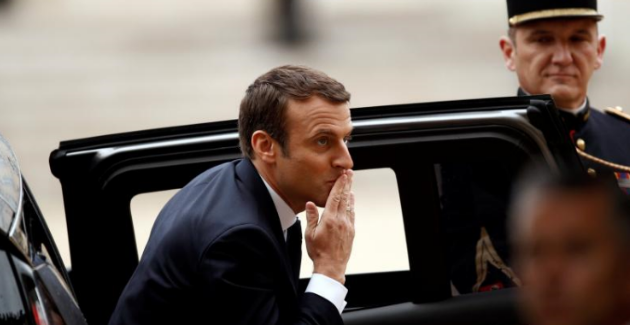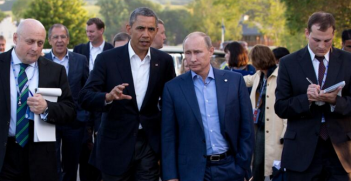France's Young President is a Setback for Eurosceptics Everywhere

To great fanfare, Emmanuel Macron was inaugurated as French president on 14 May and spent his first full day in office meeting with fellow EU leader Angela Merkel. It marks a potential reinvigoration of the European project and suggests a hard Brexit is to come.
Emmanuel Macron’s victory has provided fresh hope for the European project. His victory in the French presidential elections was predicted well in advance and the polls had given him a 20-point lead for more than three months in the second-round showdown. Nonetheless, Macron’s victory is a real achievement. His En Marche (‘Forward’) movement did not exist a year ago and yet, in one short year, he convinced enough people to vote for him, and by a much larger margin than expected.
Macron’s election is also positive news for the European Union. France, along with Germany, is one of the two pillars of stability for the union, and Macron’s pro-European stance will cement the emerging (and unexpected) unity between other European Union countries following the Brexit decision.
In shoring up the consistency of Europe’s position on Brexit, Macron’s victory is bad news for British Prime Minister Theresa May. May has worked hard to divide the EU countries to get a better deal for the UK on the terms of Brexit. So far, however, the divide and rule tactics have not worked. Even prior to the French election, members of the European Union had shown an unexpected unity in the face of the Brexit vote, but this could have been scuppered if Marine Le Pen had won the presidency. Macron’s victory will foil May’s tactics. Contrary to her hopes and strategy, May is now facing a more strongly unified Europe in her upcoming negotiations.
The French negotiator on Brexit, Michel Barnier, will gain traction from Macron’s victory. A week prior to the election, Barnier noted publicly that May seemed not to understand that Britain’s exit from the European Union would have to be undertaken within the rules of the European Union itself; rules that in the past the UK had approved. In other words, the European Union will advocate for a ‘hard Brexit’, one where the UK must leave the European Union single market and renegotiate trade deals under World Trade Organization rules.
It’s not only the UK government that should worry about the impetus the EU has received from Macron’s victory. Macron has a plan for Paris to replace London as the European ‘city of finance’. Yet he is not the only European leader with such ambitions: Frankfurt, Vilnius and Amsterdam are all vying for London’s bankers in the post-Brexit era.
By the same token, this is a real loss for those who vehemently oppose the EU project. Macron’s election may halt the dreaded wave of populism that started with Brexit in the UK and continued with Trump’s victory in the US. Following the defeat of far-right politician Geert Wilders in the Netherlands, France’s rejection of Le Pen indicates that populist politics has not had a domino effect on continental Europe.
The next election in Europe will be in Germany in September, and polls currently place the populist party there way behind Angela Merkel’s Christian Democratic Union and Martin Schultz’s Social Democratic Party. Although the extreme right in Germany is polling at 15 per cent, Merkel’s party won the regional election earlier this month in Schleswig-Holstein. This local victory was a test for Merkel, especially given the criticism her policy to welcome refugees from Syria has received.
Macron’s victory is also bad news for existing right-wing European governments that have been trying to flout EU rules. While voters in the Netherlands and France may have halted the rise of populism in those countries, right-wing leaders are already in power in Poland and Hungary. Their anti-liberal governments have disregarded the rules of law promoted by the EU. They have fired adversarial civil servants and paralysed their countries’ constitutional systems of law. Marine Le Pen’s defeat will particularly undermine the anti-liberal far-right government in Poland, already humiliated by the re-election of Donald Tusk for a second term as European Council president; the Polish government had threatened that Poland would leave the EU if Tusk, a former prime minister of Poland, was re-elected.
Finally, Macron’s victory is bad news for Russia. For several weeks, Sputnik and Russia Today interfered in the French presidential election by distributing damaging false information about Macron. Russian interference reached its height when En Marche was hacked two days prior to the election. Marine Le Pen’s political adviser, Florian Philippot, was fast to relay some of this false information through his Twitter account. However, the hacking did not have the negative impact expected. The mainstream media in France were advised by the electoral commission not to publish it as, by French rules, the official political campaign ended the Friday before the election, imposing a media blackout. But while this latest instance of election hacking did not have any great impact in France, it will have an impact in the US, where it will provide the Democrats with further justification to investigate Russian interference in their country’s election last year.
Towards the end of the campaign, Macron offered voters a guarantee that the treaty with the European Union would be renegotiated to improve it and better protect the French population’s interests. This political move was aimed at easing concerns that some voters had with his pro-European political agenda. The next five years may well see a series of negotiations to this end. However, Macron’s influence and the optimism that his election has triggered will only last if he gets a majority in the lower house at the forthcoming parliamentary elections. The poll will take place between 11 June and 18 June and will be the real test. If Macron fails to deliver during his term, the populist wave, which saw Marine Le Pen gain the largest ever share of the vote for the National Front in a presidential election, may return with greater strength.
Dr Maryse Helbert is a lecturer in environmental studies at the University of Melbourne. In 2016 she was awarded a PhD by the University of Melbourne for her research at the crossroads of feminist studies, environmental studies and critical political economy.
This article is published under a Creative Commons Licence and may be republished with attribution.





